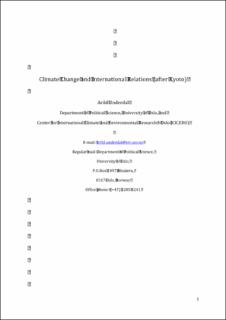Climate Change and International Relations (After Kyoto)
Peer reviewed, Journal article
Accepted version
Permanent lenke
https://hdl.handle.net/11250/2753853Utgivelsesdato
2017Metadata
Vis full innførselSamlinger
- Journal articles [478]
Originalversjon
Annual review of political science (Palo Alto, Calif. Print). 2017, 20 169-188. 10.1146/annurev-polisci-052715-111713Sammendrag
This review “diagnoses” climate change as an international governance challenge and explores the political feasibility of alternative “cures.” Human activities’ growing effect on Earth's climate system is extremely challenging, characterized by, inter alia, very long time lags between mitigation measures (∼costs) and environmental effects (∼benefits) and by stark asymmetries between “guilt” in causing the problem and vulnerability to climate change. Two main cures have been suggested. Some analysts argue that because climate change is a global process, adequate solutions must likewise be global. Others shift attention from the challenge's format to the sources of human motivation, arguing that a decentralized (bottom-up) approach will more directly engage a wider spectrum of motivations and actors. These cures are neither mutually exclusive nor easily combined. IR research contributes more to the former cure than to the latter but can play a constructive role in linking them.
